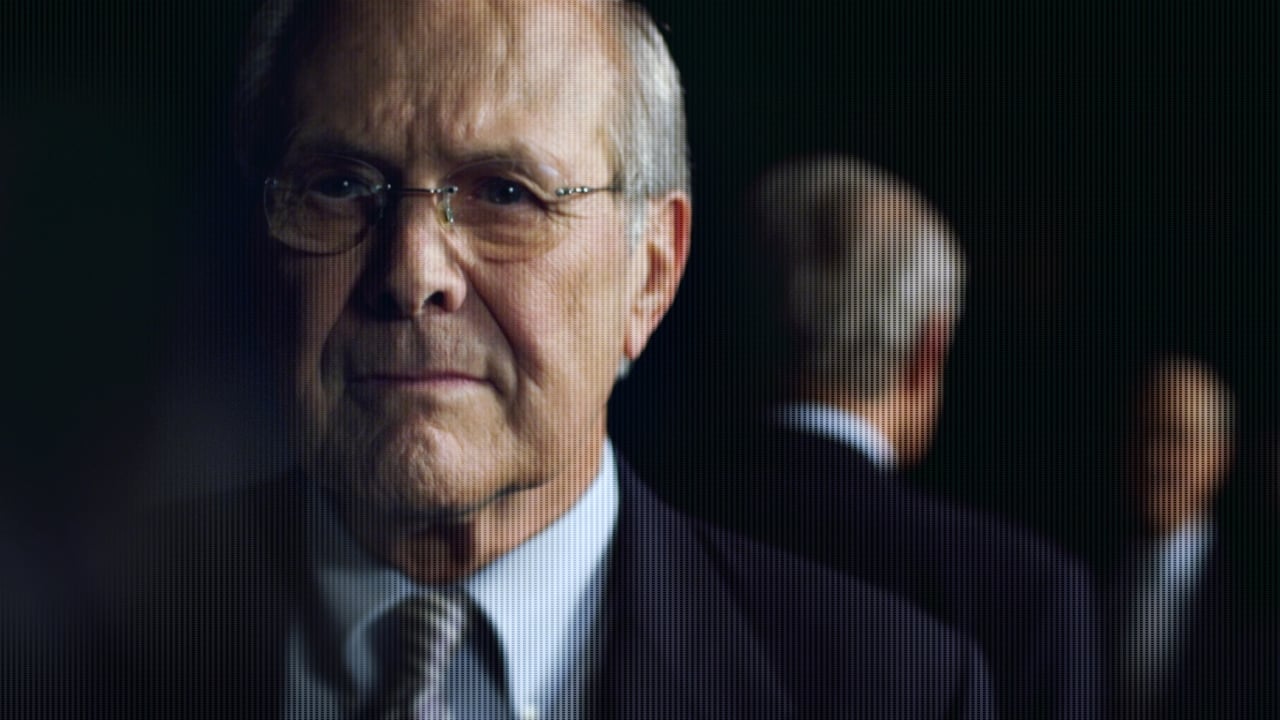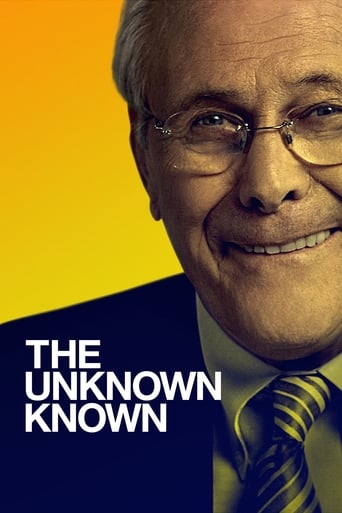

one of my absolute favorites!
... View MoreA film of deceptively outspoken contemporary relevance, this is cinema at its most alert, alarming and alive.
... View MoreAmazing worth wacthing. So good. Biased but well made with many good points.
... View MoreThere are moments in this movie where the great movie it could've been peek out... They're fleeting, here, but they're worth savoring, and they happen often enough to make it worth your while.
... View MoreEither Errol Morris underestimated Donald Rumsfeld or he was overly confident about the power of his medium, but the result is far below The Fog of War.Sure McNamara had had time to mellow and he wouldn't deny mistakes while Rumsfeld won't move an inch, except for the staged emotional bit, so in the Unknown Known we only have politics at its worst: unabashed dissimulation, total rejection of any form of empathy (while it was one of the Eleven Lessons from Robert S. McNamara, Empathize with your Enemy) all wrapped up in the flag and under the pretence that "We, the Best Breed of Politicians, have to make important decisions that are way too complex for you, Little Man, to begin to understand".Watching Rumsfeld having it his way, no less than during his own press conferences where he toyed around with journalists, is a profoundly disgusting and distressing vision. He unflinchingly tell us "Ok, eventually there were no Weapons of Mass Destruction in Irak, intelligence was flawed, but going after Saddam Hussein has made the world a better place all the same". Intelligence was not just flawed, it was distorted and even fabricated to please the warmongers.Bad things (like torture) just happens. Even when you are doing a heck of a job. That is Rumsfeld definitive argument and Errol Morris gets stuck in the "beauty of evil rhetorics" like a deer in the headlights. It is distressing to think that someone watching this without knowing all the subtext would think of Rumsfeld as a role model for Statesmen. The only redeeming part is that the documentary succeeds in suggesting how big a SOB Rumsfeld has been during his career, so much so that Reagan picked his rival George HW Bush as his running mate, sparing the World the disaster of having Rumsfeld President in the 80s. Then he had to work for Bush Jr and his former deputy, yet maybe that gave the same general disaster (geopolitical, economical...) as having Rumsfeld officially in the Oval Office.
... View MoreThis Errol Morris documentary grew from 34 hours of interviews with former White House chief of staff, ambassador to NATO, head of the Office of Economic Opportunity, special Mid-East envoy, and twice Secretary of Defense Donald Rumsfeld. "Rumsfeld—in case you've forgotten his prominent public persona as a star of Bush-era press conferences—" Slate reviewer Dana Stevens reminds us, "tends to express himself in koan-like platitudes that hover in midair somewhere over the divide between timeless wisdom and obfuscatory bullshit." The film's title is based on one of his better-known riffs, the evasive and insufficiently serious response to a reporter's question in 2002 about the evidence for Iraq's link to terrorism and weapons of mass destruction. Rumsfeld responded that there are "known knowns" (stuff we know that we know), "known unknowns" (stuff we know that we don't know), and unknown unknowns (stuff we don't know that we don't know). The premise of The Unknown Known is there also was stuff Rumsfeld thought he knew, and didn't. Which sums up the whole stated justification for the Iraq war.It's hard to watch this movie without being distracted by one's own political views, as Rumsfeld, ever the cagey communicator, genially evades and stonewalls where he has to, especially regarding the use of torture. Yet he is capable of showing uncertainty—and would that he'd done so a dozen years ago. The interviews are interspersed with news clips, excerpts from news conferences, and on-the-ground footage of the time, so you do see some misremembering. His then-conviction about whether Iraq possessed weapons of mass destruction is quite a contrast to his "I guess time will tell" shrug regarding whether the Iraq war was a good idea or not.His evasions degrade political language, Forbes reviewer Tim Reuter suggests, and by constantly redefining difficult issues, Rumsfeld erases their meaning, rather than clarifies. In his New York Times review, A. O. Scott says Morris gives Rumsfeld "plenty of rope, but rather than hang himself, Mr. Rumsfeld tries to fashion a ladder and escape through the window." One problem he couldn't slip out of was Abu Ghraib, because shocked Americans had seen the terrible pictures. As head of the Department of Defense, he offered President Bush his resignation—twice. But Bush didn't accept it.Rumsfeld's many memos were called "snowflakes," and he blanketed the Department and his fellow Cabinet members with some 20,000 of them during his six years in the Bush Administration. In the film, he reads from a number of them, now declassified. Yet the viewer, like the recipients of that blizzard of memos sees only the Don Rumsfeld he wants us to see. Given his penchant for verbal legerdemain, he must have enjoyed the idea of snowflakes. Of snow. And of snow-jobs.UPDATE: In January 2015, I saw Morris's other documentary on a former Secretary of Defense, The Fog of War, created from interviews with Robert McNamara. While, like Rumsfeld, he sees history from his own particular vantage-point, unlike Rumsfeld, McNamara seemed to have learned some significant intellectual and emotional truths from the experience. The film in fact is organized around 11 "lessons." The difference in affect between the two men is remarkable. Although there were questions (mostly personal) McNamara declined to answer, he wasn't trying to obfuscate and he wasn't insufferably smug.
... View MoreI have glanced through the reviews for "Known Unknowns" and I think people's intuitive response to this film, whatever they are are serious and thoughtful - probably the most thoughtful reviews of any movie or documentary around.The comparison of this movie to "The Fog OF War" is natural, I think FOW is the better movie because it seems McNamara is more honest and open and comes from an age of at least attempted honor and sincerity.Rumsfeld does not even answer the question of why he participated in the movie. I think it is to extend his "act" and to make it seem or state that he has no remorse or second thoughts. This is very interesting because in my opinion, whatever direction of political bend the US has at any moment the real problems are generated by people with absolute certainty that feel no second thoughts about playing with millions of people's lives.One of the biggest things Rumsfeld did, his trademark change was the use of contractors in the military - and this movie does not give one line to it. Maybe a good question is why Errol Morris participated in this movie, because I don't think he got much from Rumsfeld but the reading go his vapid self-indulgent memos ... many of which ask his staff to find the dictionary definitions of terms and "type them up".Yet I think that Rumsfeld is a very smart man and is doing things in the US and for the world in the context of this beliefs that need to be done, draining the swamp so to speak of the Middle East. The country has gotten to the point where pursuing "it's destiny" (as the top level elites see it) by its very nature seems to require a kind of shadow government that can and sometimes does undermine the idea of the United States - and they are so busy maintaining the ruse they do not have time to see to managing most of the country.I wish one of "these guys" would come clean and lay out the vision the military has for the country, because the only way the country can move forward is if Americans understand that the military is not going away or being reduced and that is good, far from it, the military is the priority. That would make one of the best movies of all time because something needs to clearly set the expectations of the American people and the world as to the goal of the corporate elite and explain it.
... View MoreDonald Rumsfeld and Errol Morris are two senior men, not lacking success and self-esteem, Errol offering an audience and to Donald, to re-write his Historie.What usually interests the film-maker is how people try so hard not to see the truth. Interesting angle. The movie was born from the numerous memos from Donald Rumsfeld, also a good Start! The movie has a high quality production and the effects are great, the soundtrack is pervasive that is where all begins. It is produced like a Hollywood movie and formally gives the impressions of deepness. As spectator, it is embarrassing to see this long PR-Advertisement. Rumsfeld knows how to behave in front of a camera. He knows how to confuse, using pseudo-philosophical generalizations like The "unknown known". Unfortunately, the story-telling is full of inaccuracies and lies. The spectator is left alone, without anybody to counters or explains the infatuations of this guy.Irak had been invaded because the FBI was delivering wrong information? I invite you to watch the movie "Fair Game" instead of "the Unknown Known" Rumsfeld pronounces the name of Dick Cheney, I would have wished his view about the privatization of the war through companies like Halliburton and Blackwater.I wish I would have not seen this propaganda-movie. The only thing I learnt is to avoid the next movies from Errol Morris.
... View More